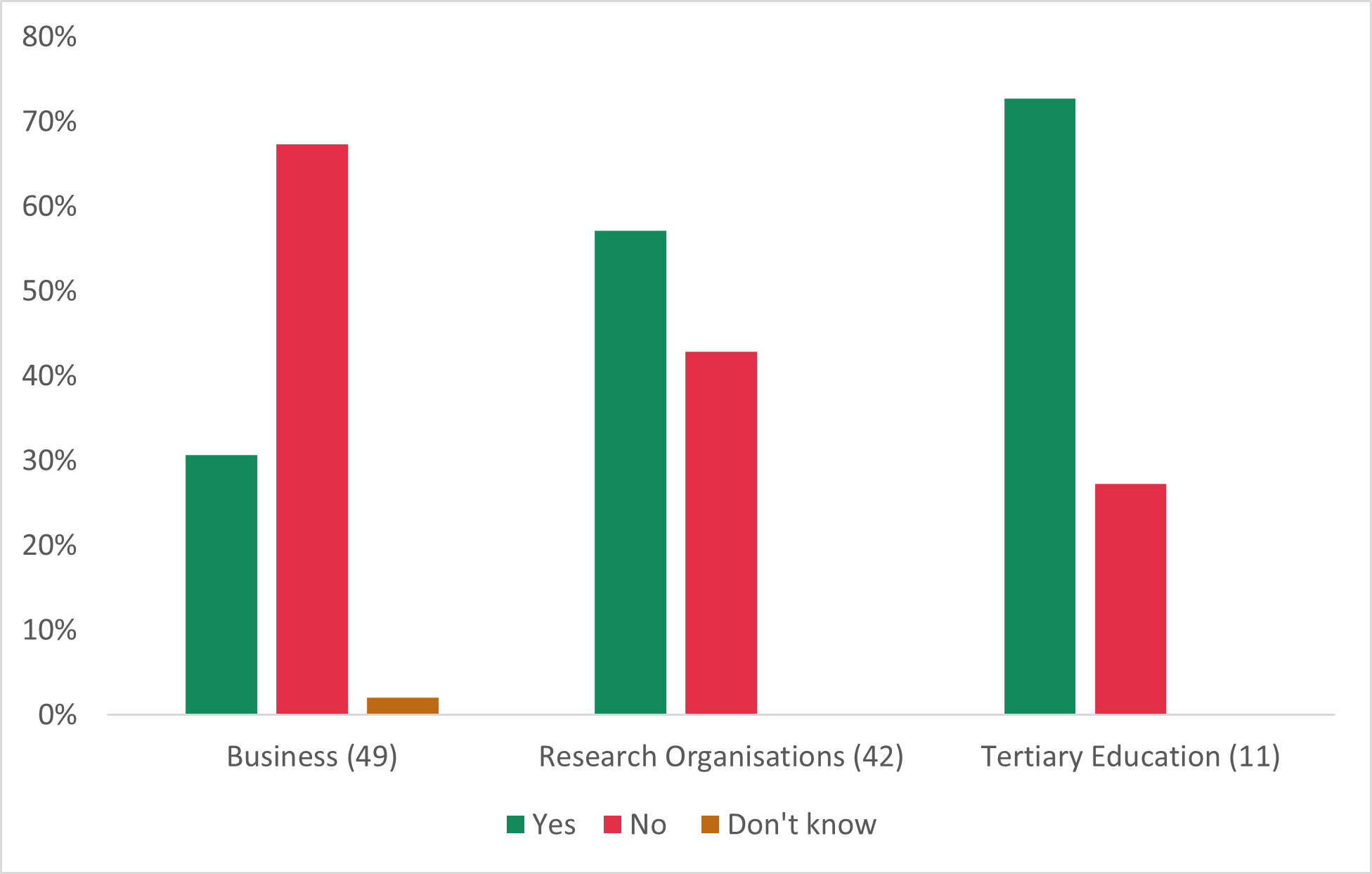Rapu Kaimahi i Tāwāhi | Overseas Recruitment
International connections, including the movement of individuals, play a key role in Aotearoa New Zealand’s RSI system. To help better understand this aspect of the system, we asked RSI organisations about their reasons for hiring members of the RSI workforce from abroad and the barriers to doing so.
On this page
We asked organisations whether they recruit people from overseas. This varies substantially across organisation types. Most (73%) TEI respondents, including all universities, recruit staff from overseas. This falls to 57% of ROs and only 30% of business respondents who recruit staff from overseas (see Figure 6).
Figure 6: Organisations that recruit staff from overseas

- 102 organisations responded to this question
- 2. Data Source: Workforce Organisations Survey.
Text description of chart
Respondents provided consistent reasons for hiring staff from overseas. These were to address a lack of domestic candidates with required skills and experience, bring new knowledge and build NZ capability, and to enhance international connection and competitiveness.
Other reasons identified included to explore new markets and to increase productivity.
He iti rawa ngā kaitono o te motu me ngā huinga pūkenga, mākohakoha rānei e hiahiatia ana | A lack of domestic candidates with required skillsets or expertise
The most common given reason for RSI organisations hiring staff from overseas is that they cannot find candidates with the required skillsets and expertise within New Zealand.
“When looking for the best candidates for a role, it is necessary to look overseas as well as locally in Aotearoa because the pool of potential candidates for specialist roles is narrow in Aotearoa. For example, conservators are specialists in their field and there is no training available in Aotearoa for this role. Curators are predominantly recruited from overseas, unless there is a kiwi who is trained overseas in this field.” – Other
Te mau mai i te mōhotanga kanorau me te hanga i te raukaha o Aotearoa | To bring diverse knowledge and build New Zealand capability
Organisations believe international candidates can bring new and diverse knowledge to build and complement Aotearoa New Zealand’s capability.
“Hiring overseas staff brings different people with various experiences onto the same research, which extends varied approaches to research based on their background or experience. Diversified views can help mitigate the roadblocks encountered locally. It can also help with educating the entire team to think strategically and emerge with alternative solutions.” – University
Te whakarei i ngā hononga ā-ao me te wairua whakataetae | To enhance international connections and competitiveness
Another important influence on international hiring decisions for RSI organisations, particularly universities, is to enhance their international connections and competitiveness.
“International collaboration and an internationalised RSI system is vital to our future success in addressing local, regional, and global challenges. Recruiting staff from overseas is critical to fostering and supporting our international competitiveness and collaborative linkages.” – University
Ngā tauārai ki te rapu kaimahi i tāwāhi | Barriers to overseas recruitment
Responses to the Survey indicate the three main barriers to RSI organisations recruiting and retaining international talent are complex immigration processes, uncompetitive salaries and high living costs, and high recruitment and relocation costs.
Tukanga hekenga matatini Complex | Immigration process
The dominant barrier for RSI organisations to recruit overseas staff is the immigration and visa application process. Respondents indicated that the COVID-19 border and travel restrictions exacerbated this barrier.
“Presently the challenges with the borders being closed, Immigration NZ limitations to obtaining work visas. Prior to that, it is more costly to bring employees in from overseas due to relocation costs, immigration costs, travel costs.” – Business
“Immigration – the uncertainty of visa longevity; slow processing times; getting visa or variations approved.” – IRO
Ngā utu ā-tau whakataetae kore me ngā utu noho nunui | Uncompetitive salaries and high living costs
Respondents said salaries for RSI roles in Aotearoa New Zealand are not internationally competitive, especially given Aotearoa New Zealand’s high living costs. These two factors combined make it difficult to attract and retain overseas candidates.
“Salaries are often not competitive compared to international markets.” – CRI
“It is difficult to offer competitive salaries against similar institutions or organisations based overseas. This can hinder the candidate pool at the application stage and can cause us to lose ideal candidates.” – Other
“Depending on applicants’ current locations, NZ salary levels and housing prices can be a deterrent.” – University
Rapu kaimahi i tāwāhi me nga utu hūnuku mai | Overseas recruitment and relocation costs
The costs of recruiting and relocating international candidates are high for many organisations. The process is also complex and time-consuming, which stops many organisations from recruiting overseas staff. However, many of these costs appear to be linked to the COVID-19 border measures, indicating that this barrier to overseas recruitment may reduce with the reduction or removal of COVID-19 border restrictions.
“It is more costly to bring employees in from overseas due to relocation costs, immigration costs, travel costs.” – Business
“Some of the prominent disadvantages of recruiting from overseas include the legislative requirements, administrative procedures and recruitment costs (especially if unsuccessful) and time delays can be barriers.” – University

